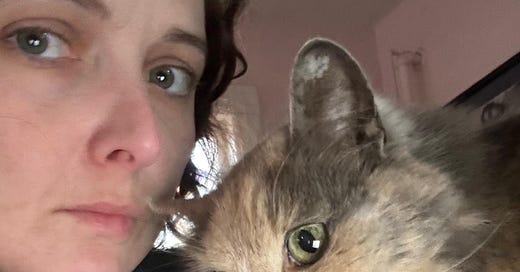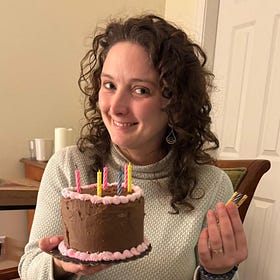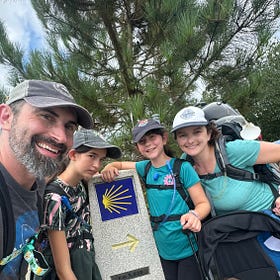Somewhere in the multiverse, there is an Alicia who spent last Friday night at the fourth-to-last production of Sleep No More, a vanguard immersive theater production that closed on January 5, 2025 after running for the better part of 12 years, who planned to write about that today.
Alas. The universe this Alicia lives in had other plans.
Instead, I have spent the last week in a less pleasant immersive experience: the anticipation of death. Spending extended periods of time sitting with someone who is dying has an outsized effect on the life of the living. Time warps — hours stretch into odd shapes that resemble days, but barely. Death feels both imminent and unknowable, and so the waiting demands both bated breath and unending patience, which together can only be sustained among the living for so long.
This is my fourth deathbed vigil. I was with both my grandmothers at their passing when I was 17 and then 23, and I arrived to say farewell with family to my aunt when she was taken off life support after suffering a delayed resuscitation when I was 21. Accompanying the living into death isn’t something people other than hospice care workers expect to do very often, and I expect my numbers are higher than the average person my age. As humans, we’re often taught to fear death, to anticipate it with anxiety and trepidation, to avoid interaction with it at all costs. But I find what happens before a person dies to be a kind of exercise in humanity — an examination of how the dying person has lived and how those who surround them will continue to do so.
When in Doubt, Make Meatballs
Attending to death is a team sport. It’s a reminder of the complexity and challenge of our primary assignment on planet earth: staying alive. While the dying are trying to take an inventory of their choices and withdraw their lifeforce into the kernel of their soul, the living who surround them are still engaged in the struggle of staying alive. We postpone life obligations and subsist on coffee, soup, and the generosity of neighbors.
Staying alive requires two things that can be in short supply when someone is on the verge of death: calories and sleep. Over the last seven months, as Will has been in a struggle with a virus that ultimately overcame him, I have prepared more meatballs and lasagna than I have over the course of my life. I have mashed pork and beef together in an attempt to be useful when there is nothing else I can do, and have baked and frozen close to a dozen sheets of lasagna. While Will was being fed through a tube, his wife still needed to eat. How can someone tasked with the ongoing care of someone who may be dying muster the conviction to decide what to make for dinner?
When I wasn’t at his bedside, I was in the kitchen, making anything that could easily be reheated in a microwave — still more lasagna, baked ziti, beans and rice, pasta, egg bake — to feed the small army of people waiting for his final hour. But I was not alone. Neighbors and friends brought soup, casseroles, and other microwavable meals. When the dying finally take their last breath, of course, there is still more to do, and one can only hope, the calories to sustain the effort will keep coming.
During this time of struggle, I have also been fortunate for the people who have generously given their time to care for my son, to give me space to work or be with Will and family. These people, who have given their time to a child not for money but from the goodness of their hearts, are both earning karmic points and enshrining themselves in a special place in a young boy’s heart. One man who is himself a grandfather to four children, has become a kind of surrogate grandfather to my son in his own grandfather’s absence. Still learning words for who is who, my son simply calls him “My guy,” an indication of how much this man who was once a stranger now means to him.
What is Waiting on the Other Side?
For most of my adult life, I’ve believed in karma and reincarnation. I understand pragmatic atheists may be skeptical of such views, but my lived experience has led me to believe that there are in fact young souls and old souls, based on their number of life cycles. I like to think of human life like a video game. You are born into a world and an existence with an objective — an action to complete, a lesson to learn. Your life offers you certain opportunities you can capitalize on and any number of obstacles you have to overcome. Some people will spend their entire long lives trying to achieve the mission, and take their last breath knowing they’ve missed the mark, and they’ll have to come back to try again. Other people will flame out early and give up the mission, by way of accident or suicide. And then there are those who just get it done. They figure out the objective of the game. They win, and once they do, their cycle is complete.
My maternal grandmother, Marjorie, died in the summer of 2003, at 92 years old. Her husband, Jimmy, died the previous December, and after his death, she warned my mother: “You watch. Six months from now I’ll be dead.” It was a prognostication bound to come true. In their older years, she and Jimmy had developed a virtuous co-dependent relationship. She had lost her sight and he had lost some of his mental acuity, so she did the mental work of household management while Jimmy did the sighted, able-bodied work of the tasks themselves. I can’t imagine she relished the idea of life without him.
That June, she went to a regular doctor’s visit with a cough and the doctor sent her to the hospital with pneumonia. A few days later, she aspirated on a piece of food and her condition worsened. I watched Marjorie struggle with the question of whether or not she was ready to die. And when she was, she whispered just one word: “Morphine.” I relayed the information to her medical proxy and the hospital staff, and 36 hours later, she was dead, almost six months to the day after her husband’s death. Knowing what I do about my family’s history, I doubt she felt she’d completed the mission. But she’d run out of time. She was ready to quit.
My paternal grandmother, Eleanor, died six years later, in the fall of 2009. She had lost her husband two decades earlier to a series of strokes and underlying health conditions, and her daughter to aggressive brain cancer just three years before. Since her husband’s death, she’d spent her life helping to raise and care for her five grandchildren, the youngest of whom was now 14. At 85 years old, she had incurable ovarian cancer. She knew she was done, though still pissed she wouldn’t make it to 87 like her two sisters. She sorted through all her earthly belongings, separating the trash from the donations and the belongings she’d leave to her grandchildren. She left specific instructions for who should be informed of her death, and directions that her funeral should be followed by a celebration of a life well-lived. She checked herself into hospice, and a week later, she died. Eleanor had many faults, but a lack of fortitude and persistence weren’t among them. Did she win or lose? Who knows. Maybe she hadn’t fully completed her karmic assignment. A lifelong bridge player, she would have appreciated a bridge metaphor over a video game, and she sure played the hell out of the hand she was dealt. Either way, I always respected her decisive “do or do not do” attitude about being alive.
Then there are those whose death feels like a great injustice — a life so well lived, ended too soon, which inflicts untold depths of pain and grief. My aunt Linda, who died at 54 of brain cancer, was one of the kindest people I ever knew. I never heard her speak a mean word about another person. She became a nurse who worked first in women’s prisons and then in schools, helping inmates and high school students alike navigate the challenges of everyday illness. She was the anchor of our extended family, organizing holiday parties and family meals. More than 200 people attended her funeral. Her early death was a gut punch to everyone who knew her and it tore the fabric of our family in profound and irreparable ways. I struggled for a long time to make sense of how such a kind and caring person could die so suddenly and so young. I found no comfort in chance or randomness. I like to think she had simply finished the assignment. She’d worked off her karmic debts and paid out her expected share of good deeds. God was calling her back.
Win or Lose, It’s Game Over
The trouble with the game is you can never be sure of your own level, though I’m pretty sure that hours spent at work and dollars earned don’t count for squat in the final calculus of a life well-lived. As my husband and our family have weathered the uncertainty of my father in-law Will’s disease, the agonizing absence of a prognosis, and in the end, the onslaught of inexplicable pain, I’ve often thought, “What would Will do if this was happening to any one of us?” He’d be in the kitchen, making spaghetti pie, or by that person’s bedside, waiting to see what was needed. In addition to the sheets of lasagna and meatballs, and the long drives back and forth to New Hampshire, I’ve made friends with my in-law’s grumpy cat, who is as concerned as anyone by her master’s long absence, and buffered whatever childcare responsibilities I can to allow my husband to spend precious hours with his dad. I hope Will would feel that I honored his legacy of kindness, and that when I finally do my own karmic audit and face death myself, these long challenging months count for something.
Will’s life was one of pure loving kindness towards everyone he met, embellished by acts of creativity designed to inspire and connect those he did not yet know. Even as I have accepted the great injustice of his early death, I am heartbroken that my son, who is not yet three, will never get to know this extraordinary man.
When we first got the call that Will was “in transition” on January 2, it seemed like his life might be over sooner than we thought. But after a day of labored breathing, his oxygen level improved — he wasn’t quite ready to go. A few years ago, I read The Midnight Library, a book by Matt Haig which posits that on the verge of death, a person enters a library of their own life, where they can dive back into specific moments in time to see how events might have changed, based on different choices.
Will had been so many things in his life — a musician, a puppeteer, an art teacher, a church leader, an actor, an artist, a self-taught carpenter, and of course, a parent to two children and a dedicated spouse of 47 years. He was uniquely skilled at finding treasure among other people’s trash. In his retired years, he spent hours each week at a local thrift store, sorting bags of donations to be resold. As Will’s life stretched on through last week, and he grew less and less responsive to those around him, I liked to imagine him in his own midnight library, riffling through the books of his past, not with angst and regret as some might do, but with genuine curiosity and joy. I can see Will in that library, reimmersing himself in his successes in each of his creative domains, and the moments of joy he’d experienced as a parent, grandparent, and friend.
The thing about a video game, is whether or not you die and start over, or you beat the highest level, the result is the same: it’s game over. You can play again, but it will be in a different time and place, on different terms. Understandably, Will wasn’t quite ready to leave the remarkable life he’d lived. Until he was.
Will finally left us yesterday, around 11am. He’d heard everything he needed to hear, held every hand he needed to hold, and read every book in the library. For the first time in weeks, he was alone. We have to assume that’s how he wanted it.
More on these last months of struggle and grief:
Birthdays Will Break Your Heart
Let me begin with a disclaimer and apologize to all the people who have tried in earnest to celebrate my birthday over the years. Your efforts have been noted and appreciated. I am so grateful for the love I have been a beneficiary of in so many way. And yet, I must also acknowledge that this Sisyphean task is bound to be a losing battle.
What Just Happened, 2024?
This year has been one for the books. Unspeakably challenging, and unimaginably joyful. It’s wild and difficult to hold both things together at the same time. And yet. We persist in holding the impossible polarity to achieve life’s greatest promise.
Does anyone give any fucks anymore?
As I write this, my father-in-law, Will, is in an ambulance on the way to the emergency room. After more than six months of failed diagnosis and other healthcare bullshit, “bad” might be getting “worse.” While his wife and son sit in the emergency waiting room, hoping, praying that there is still something more to be done, I am sitting in a silent house…
What Just Happened? November 2024
November is the kind of month that smiles, punches you in the face, and leaves you for dead.










Death in our Western culture really is so far from the normalcy our ancients knew. Thank you for being so open here. And I hope that you and your family are processing well.
Beautiful reflections, Alicia. So sorry for your loss and grateful for your openness. ❤️